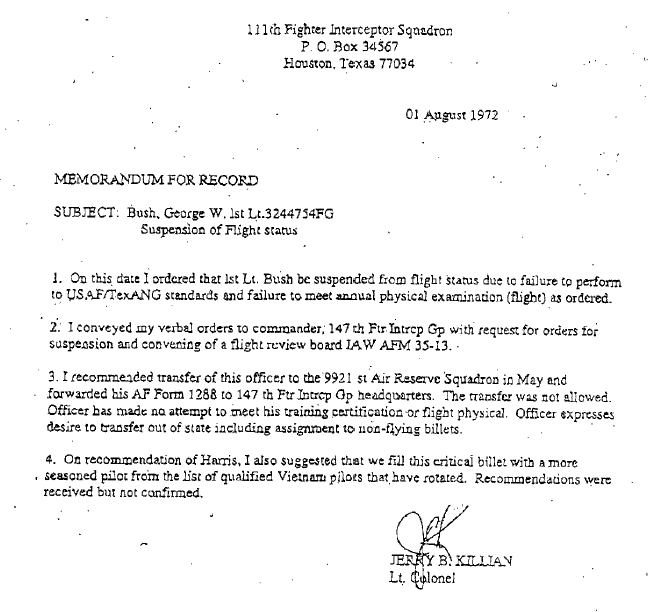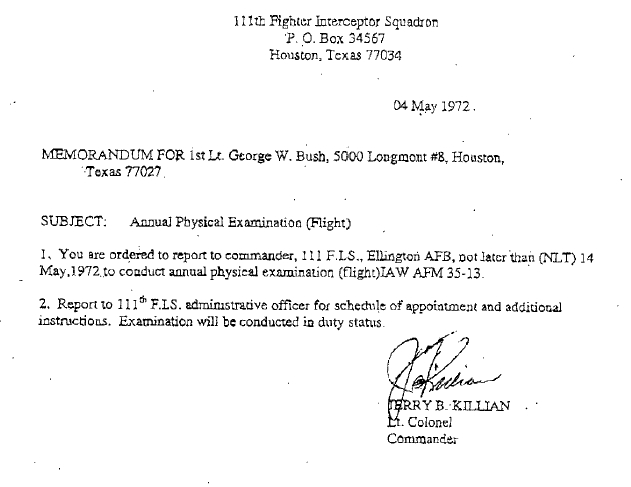Board Certified Forensic Document Examiner specializing in handwriting identification and suspect documents.
Emily J. Will, D-BFDE
Famous Documents
The documents arrived on Sunday, via courier. They were copied and faxed documents, and the reproduction quality was poor.
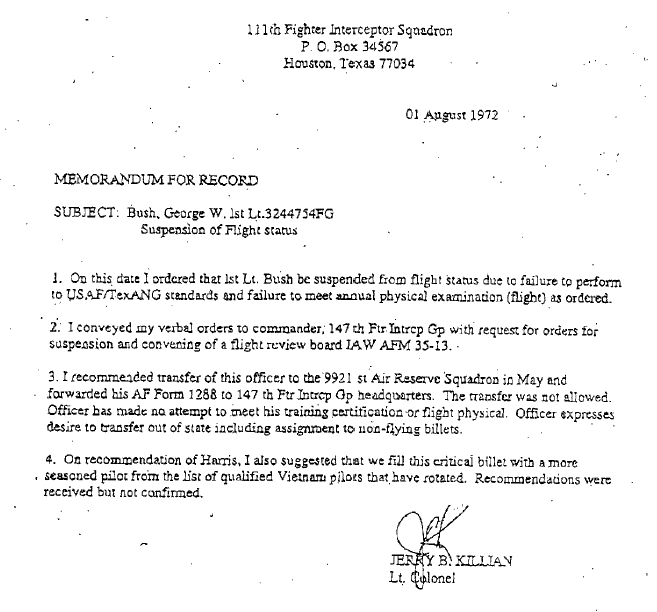
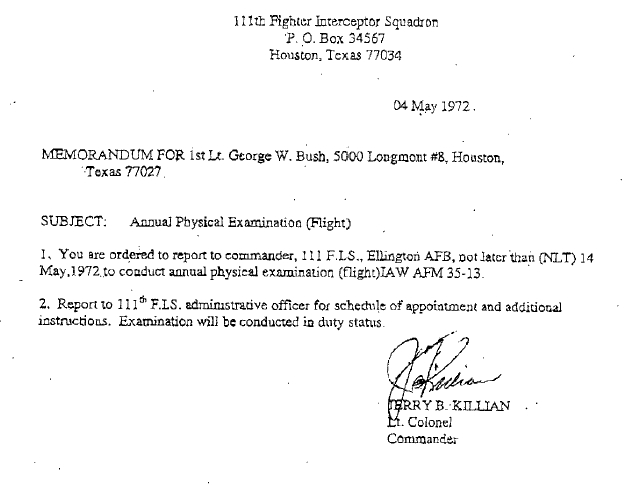
Sunday afternoon I discussed my observations with the 60 Minutes producer, and explained that the questions I had could not be answered from the poor quality reproductions available, and that without "positive" resolution of those questions it would not be possible to support the documents. I also suggested a typwriter expert who could be consulted for more information on the issue of typewriter chronology. The producer indicated that more documents would be available in the next 24 hours, and that they would be sent to me.
The program was scheduled to air on Wednesday, September 8. Having received no additional documents and no further communication from CBS by the evening of the 7th, I phoned the producer and restated my concerns about the documents. I learned that the episode was going forward, and I expressed the opinion that if the documents were presented as authentic, that all of the questions I was raising were going to be raised by other document examiners immediately after the program. This is exactly what happened. What I did not forsee was all of the commentary that would come from "the blogosphere."
For 10 days after the broadcast, 60 Minutes continued to defend the documents, and to imply that they had thoroughly vetted the documents with various document examiners. Eventually I was directly asked by a reporter at ABC Television whether I had seen the documents. I explained my participation to the reporter, which led to further explaining it on national television. When the dust settled, and an independent investigation was ordered, I explained it yet again to the investigators.
From a document examiner's point of view, the lessons to be learned from this experience are:
2. The burden of proof is usually on the proponent of a document. A journalist relying on a document in an investigative report should have the answers to any reasonable questions about the handwriting/machine printing of that document.
First, on page 167 Ms. Mapes discusses an "unusual conversation" that she and I supposedly had on the Monday that would have been Labor Day, 2004. Here is what Mapes says:
"Emily Will and I had an unusual conversation that Monday, a talk that raised questions for me about how well-suited she was to be working on this project. I called to see how her analysis was going and she told me she had a problem with the documents. Concerned, I asked her what the trouble was. She said that she had done research on the Internet about President Bush's military record and fount that he had been in Alabama at the time these documents were written, so there was no way they could be true"
The conversation happened on Sunday and centered around the problems I had with the features of the handwriting and the typescript. I had sent Mapes (through her assistant Yvonne) an image worksheet that illustrated the problems with the handwriting and I discussed them with her, although she claimed not to have received the worksheet.
Our conversation focused on the handwriting problems and my concerns about some aspects of the typing, such as the superscripting of the date. I told her I had been on the internet looking for more information about the date of inception of superscripting, and I gave her the name of an expert in typewriting who would have more experience than I had in that area.
And, I mentioned that when I laid all of the documents out and looked at their content, I thought that there were some possible contradictions that they should investigate further.
On Page 183, Mapes reports correctly that I was communicating with Yvonne about my concern over the superscripting of the "th" on the document letterhead. She does not, however, mention my concerns about the handwriting, which were always my emphasis. Then Mapes says that Marcel Matley (another document examiner involved in the case) had given her some reassurances about the typewriting and that I then said "I defer to Marcel on this."
There are two big problems with this:
First, what we were discussing regarding Mr. Matley's opinions was handwriting, not typewriting. Mapes was trying to tell me that Matley had seen other documents that I had not seen, and therefore had different opinions about the handwriting features that were concerning me. I asked her to please send me those documents right away so that I could evaluate them and respond to what Mr. Matley was telling her. The documents never arrived.
And second, I never said that "I defer to Marcel" - or to anyone else. Although I would absolutely have deferred to the typewriting expert that I was urging her to contact on the issue of the typewriting because in that area his expertise would be greater than mine.
"Will would later tell the investigative panel that she had absolutely not deferred to Matley and that she had flagged more problems with the documents that simply the superscript "th." For my part, I have no recollection of that: I simply don't recall her raising questions about either proportional spacing or problems with the signatures."
In May, 2012, Dan Rather (with Digby Diehl) published a book entitled "Rather Outspoken." (Grand Central Publishing) I was curious and looked for my name in the Index, where it showed up in two locations. On Page 42, the authors write: "... Emily Will had a problem from the outset. She doubted that they (the Memos) were genuine, she said, because according to official records Bush had been in Alabama at the time these memos were written - which, of course was exactly the point."
So, what is wrong with this summary of events? Well, for the parts related to me, that I lived through and recall very well, just about everything is wrong. I did report problems with the documents as stated above. All of this information was available to the authors of this memoir in the report of the Independent Investigation Panel (Pg. 84), but they chose to present what I consider to be a very biased description of work in the book.
Next, on Page 53 of Rather Outspoken, when discussing the furor that took place after the 60 Minutes Wednesday program was aired, the authors state: "Emily Will and Linda James, however, backpedaled furiously and insisted they had warned that the documents could be fake. Perhaps Emily Will should have revealed that she was not exactly nonpartisan. Her initial inclination to take Bush's records at face value and presume he was in Alabama when he said he was should have been a clue. Later records show that Emily Will is a Republican Party financial supporter. From an ethical standpoint, I believe that this was an assignment she should have declined."
That is so far off the mark that is has to be reviewed one section at a time, so here we go:
1. "Emily Will and Linda James, however backpedaled furiously and......" Never. My opinion was consistent throughout the entire event, and still is. Actually, the people I saw having to backpedal and offer apologies were network people.
2. ".... and insisted they had warned that the documents could be fake." Yes, I did insist that this could be the case, and still do. My statements were backed up by comments from CBS staff person Yvonne Miller and by my own phone records.
3. "Perhaps Emily Will should have revealed that she was not exactly nonpartisan." I never been registered with either affiliated party. I vote for individuals and ideas, not parties. Is Mr. Rather presenting himself as "nonpartisan?" He certainly has no grounds to criticize me in this regard. Furthermore, I resent the implication that even if I were partisan I would not be able to separate that from my examination of documents. This is nonsense. Are all journalists nonpartisan? If they are not, are they unable to report a story properly?
4. "Her initial inclination to take Bush's records at face value and presume he was in Alabama when he said he was should have been a clue." This is not what I did or said. Dan Rather and Digby Diehl should be embarrassed to have written such drivel.
5. "Later records show that Emily Will is a Republican Party financial supporter." In 2008 - FOUR years after this event, for the first and only time, I donated money to a political party. How did that prevent me from expressing a proper opinion on a document in 2004? No wonder Mr. Rather got into so much hot water in the first place with that type of thinking.
6. "From an ethical standpoint, I believe that this was an assignment she should have declined." If you have read this far, you know what I think about this statement. My ethics are firmly intact, and I stand behind my conduct during this assignment. There are ethical issues here, but they are not mine.
By the way, eventually CBS apologized in writing for the "harsh accusations" made against me. Perhaps some day Mr. Rather and Mr. Diehl will do so as well.
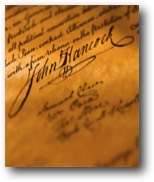
I am neither an ink nor paper chemist, and I did some networking to locate such experts who would be willing to work with me if my preliminary examination indicated that the document had a chance of being authentic. I also spoke with archivists who helped me secure additional comparison signatures of the people whose names I expected to see signed on the document. When the time for the trip came, I felt as prepared as possible to do at least a preliminary investigation and then to route the document to additional experts for non-destructive testing.
I reached my destination via plane and rental car, checked into a hotel, and arranged to meet with my client. This document had become a focal point of the lives of this man and his family. If it were genuine it would have great value, and there was a question of pride involved as well. Unfortunately, it did not take long for me to shatter their fondest hopes. A careful look through the microscope revealed that the printing process used on the document was not available in the late 1700's. The signatures were not done individually in ink as the owner of the document had insisted they were. My final conclulsion, which was later borne out by a paper expert, was that at best the document was one of many sets printed commemoratively in 1876 at the Centennial celebration of the Revolution. This would set its value at approximately $100.00 according to a consultant at a famous auction house. My client was very disappointed, but glad to have the matter resolved. I was also disappointed, but not surprised. I was glad to have had the impetus to learn more about American history and to feel close to it for a brief time.
